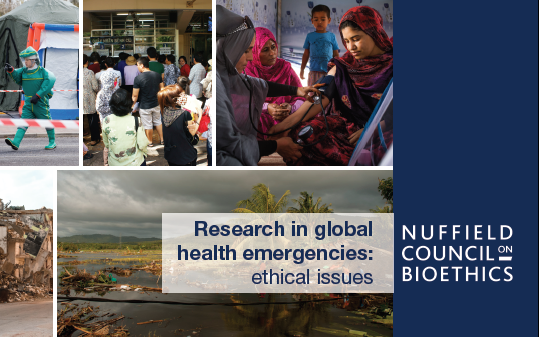Action needed to ensure research is carried out ethically in global health emergencies
Governments, funders, and research bodies must take action to ensure that research is undertaken ethically during global health emergencies, says a new report from the Nuffield Council on Bioethics.

Adapted from Nuffield Council on Bioethics Press Release
The Nuffield Council on Bioethics has today issued a Call for Action to research funders, governments, and others involved in health research systems for a more ethical and collaborative approach to conducting research during emergencies such as infectious disease outbreaks.
The latest novel coronavirus outbreak in Wuhan, China, illustrates how suddenly new threats can emerge, and the important role that research has to play in understanding the nature of the threat, and how to respond effectively.
The pressures and distressing circumstances of such emergency situations can lead to uncertainty about what is ethically acceptable with regards to conducting research, which may mean valuable research is impeded, or that unethical practices could creep in undetected.
Following a two-year inquiry, the Nuffield Council’s Call for Action highlights a number of proposals including:
- More investment in community engagement so that local voices can be heard, and that everyone involved in research in global health emergencies is treated fairly and respectfully.
- Ensuring that, before proceeding with any research project, participants’ basic health needs are being addressed. Funders will need to work in partnerships with humanitarian organisations and health ministries to achieve this.
- Better support for emergency planning, to secure robust health and health research systems - given the vital importance of properly resourced preparedness between emergencies.
The Call for Action is supported by international research institutions and organisations including:
- International Rescue Committee
- The African Academy of Sciences
- Médecins Sans Frontières UK
- London School of Hygiene & Tropical Medicine
- Elrha - a global humanitarian research charity
- Fundação Oswaldo Cruz (Fiocruz)
- Geneva Centre for Education and Research in Humanitarian Action
In its full report, the Nuffield Council on Bioethics makes 24 recommendations for changes to align the policies and practices of global health emergency research with three core values: fairness, equal respect, and helping reduce suffering. The report presents these values in the form of an ‘ethical compass’ to guide the conduct of the very wide range of people involved in research in global health emergencies. These emergencies are challenging environments in which to conduct research, involving much disruption, distress and uncertainty about how and when to proceed and who to involve. The ethical compass will support people in addressing these uncertainties, both on the ground, and at policy level.
Professor Michael Parker, Chair of the Nuffield Council on Bioethics working group on global health emergencies, said:
“Research undertaken during global health emergencies involves real people, families, and communities. It asks a great deal of them, primarily in the interests of others, at a time of great distress, fear, and vulnerability. We are asking anyone involved in planning, funding, and conducting research to bear this at the forefront of their minds throughout all stages of research. Listening to communities, understanding their needs and designing research that will truly help to reduce people’s suffering whilst demonstrating respect are the ideals that all research projects should be striving for.
A key finding of this report is the vital importance of properly resourced preparedness between emergencies. Preparedness and emergency planning are essential for many reasons: they mean emergencies are less likely to happen and more manageable when they do occur. They also mean that the requirements for valuable, ethical research to be conducted are more likely to be in place.”
IDDO’s Director Philippe Guérin, a member of the working group on the study, said:
“A crucial recommendation to come out of this report is that the wider use of data should be facilitated through initiatives that support ethical data sharing. IDDO’s data-sharing platforms act as the central repository for evidence relating to treatment efficacy for selected infectious diseases. The data will be standardised and analysed to address priority questions in infectious disease research. Best practices on data capture and management will be shared and IDDO has put policies in place to ensure appropriate recognition for data contributors”
For media enquiries, please contact:
Sarah Walker-Robson, Communications Manager
swalker-robson@nuffieldbioethics.org
Office: +44 (0)207 681 9619
Mobile: +44 (0)7821 449 725
About the Nuffield Council on Bioethics
The Nuffield Council on Bioethics examines ethical issues raised by new developments in biology and medicine. Established by the Nuffield Foundation in 1991, the Nuffield Council is an independent body, funded jointly by the Nuffield Foundation, the Medical Research Council and the Wellcome Trust. The Nuffield Council has an international reputation for addressing public concerns and providing independent advice to assist policy makers and stimulate debate in bioethics.
About the working group
This report and call for action follow a two-year in-depth inquiry run by an international working group. Many contributions from across the globe to this work were made through responses to an open call for evidence, participation in roundtable and one-to-one meetings, reviewing early drafts of the report, and involvement in numerous international workshops and events.
Members of the working group were appointed for their personal knowledge and expertise, and do not necessarily represent the views of their organisations.
Working group members:
Michael Parker (Chair)
Sanjoy Bhattacharya
Karl Blanchet
Simon Caney
Emily Ying Yang Chan
Beatriz da Costa Thomé
Philippe Guérin
Julian Hughes
Patricia Kingori
Heidi Larson
Soka Moses
Sharifah Sekalala
Julian Sheather
Paulina Tindana
Affiliations and biographies of working group members are available at: https://nuffieldbioethics.org/publications/research-in-global-health-emergencies/about-the-working-group.

